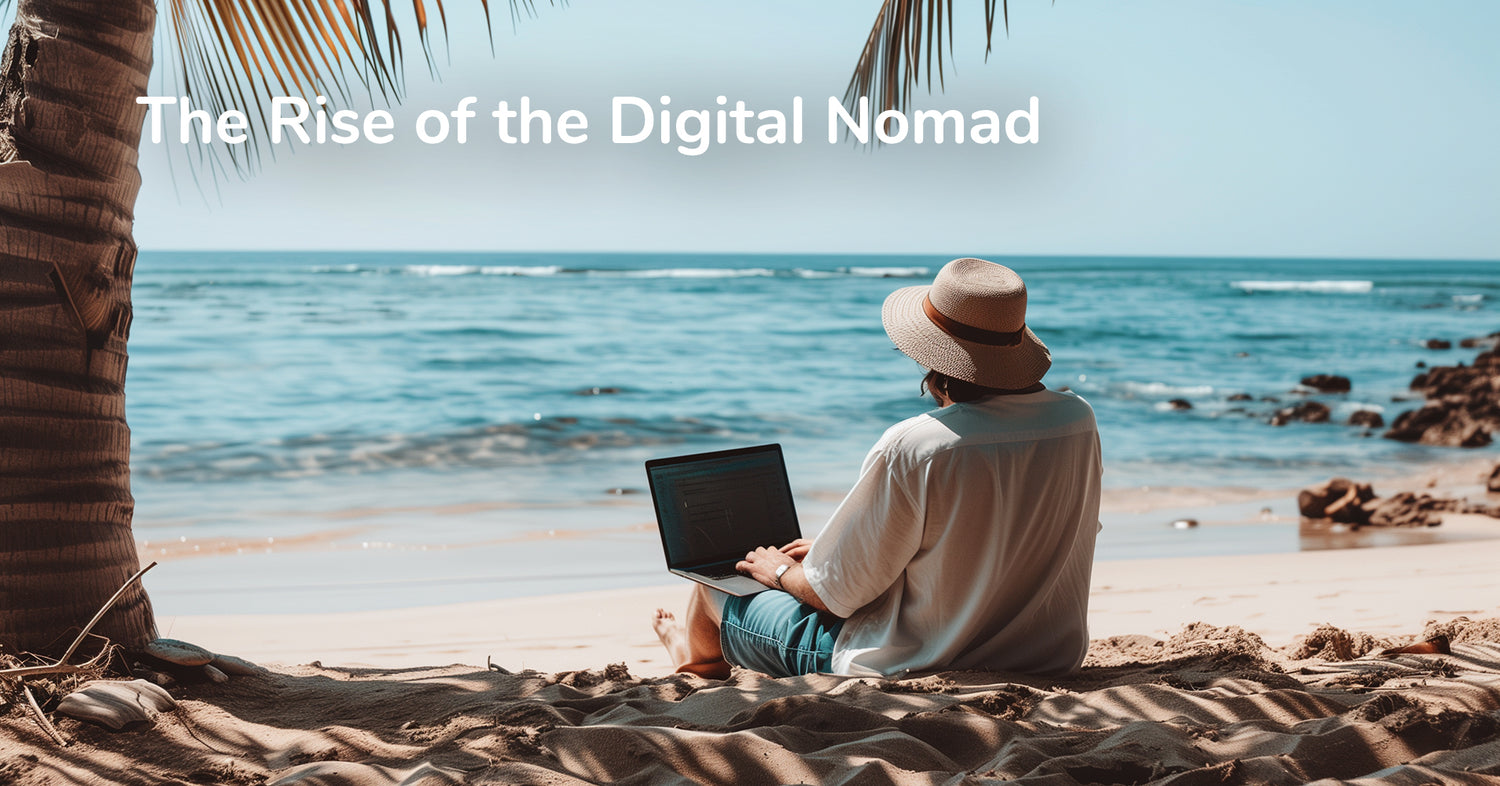The Rise of the Digital Nomad: A Deep Dive into Characteristics, Benefits, and Societal Impacts
In recent years, the term "digital nomad" has become increasingly popular. Digital nomads are individuals who leverage technology to work remotely and live a nomadic lifestyle. They are not bound by traditional office spaces or geographical locations, allowing them to explore the world while maintaining their careers. This article delves into the distinct characteristics of digital nomads, the benefits and challenges they bring to the table, and their broader societal impacts.
Distinct Characteristics of Digital Nomads
1. Location Independence
The hallmark of a digital nomad is their ability to work from virtually anywhere. Whether it’s a bustling café in Barcelona, a serene beach in Bali, or a coworking space in Tokyo, digital nomads are not confined to a single location. This freedom is enabled by the internet and various digital tools that allow seamless communication and collaboration with clients and colleagues globally.
2. Flexibility
Digital nomads often enjoy flexible work hours, which allows them to manage their schedules more effectively. This flexibility means they can take advantage of off-peak travel times, avoid rush hours, and find a work-life balance that suits their personal preferences. The ability to set their own hours can lead to increased productivity and job satisfaction.
3. Tech-Savvy
Being a digital nomad requires a certain level of proficiency with technology. They must be adept at using project management software, communication tools like Slack and Zoom, cloud storage solutions such as Google Drive and Dropbox, and other digital platforms that facilitate remote work. This tech-savviness is crucial for maintaining productivity and staying connected with their professional network.
4. Minimalism
A minimalist lifestyle is often adopted by digital nomads due to the practicalities of constant travel. With limited space for belongings, they prioritize essential items and experiences over material possessions. This lifestyle shift can lead to a greater appreciation for non-material aspects of life, such as relationships, personal growth, and cultural experiences.
5. Community-Oriented
Despite their nomadic nature, digital nomads are often very community-oriented. They seek out and connect with other like-minded individuals through online forums, social media groups, and at nomad-specific events and meetups. These communities provide support, networking opportunities, and a sense of belonging, helping digital nomads navigate the challenges of their lifestyle.
Benefits of the Digital Nomad Trend
1. Enhanced Work-Life Balance
One of the most significant advantages of the digital nomad lifestyle is the enhanced work-life balance. The ability to blend work and travel allows individuals to experience new cultures and environments while maintaining their professional responsibilities. This balance can lead to reduced burnout and increased job satisfaction, as individuals are not confined to the monotonous routine of a traditional office job.
2. Economic Impact
Digital nomads contribute to the economies of the places they visit. They spend money on accommodations, food, transportation, and leisure activities, providing a boost to local businesses. Moreover, the demand for coworking spaces and other services tailored to remote workers has led to the growth of new industries and job opportunities in many regions.
3. Cultural Exchange
As digital nomads immerse themselves in different cultures, they promote cultural exchange and understanding. They bring diverse perspectives and skills to the communities they join, fostering a more inclusive and globally aware society. This exchange of ideas and practices can lead to innovation and collaboration, benefiting both the nomads and the local populations.
4. Personal Growth
The digital nomad lifestyle encourages personal growth and development. Constantly adapting to new environments, overcoming challenges, and meeting people from diverse backgrounds can lead to increased resilience, empathy, and open-mindedness. Many digital nomads report a heightened sense of self-awareness and personal fulfillment as a result of their experiences.
Challenges of the Digital Nomad Lifestyle
1. Loneliness and Isolation
While digital nomads have the opportunity to meet new people regularly, the transient nature of their lifestyle can lead to feelings of loneliness and isolation. Forming deep, long-lasting relationships can be challenging when constantly on the move. This emotional strain can impact mental health and overall well-being.
2. Stability and Security
The lack of a permanent residence can create issues related to legal status, taxes, and access to healthcare. Digital nomads must navigate different visa requirements, tax regulations, and health insurance options, which can be complex and time-consuming. Additionally, financial instability may arise from fluctuating work opportunities, making long-term planning difficult.
3. Productivity Concerns
Maintaining productivity can be challenging for digital nomads, especially when distractions from travel and new environments arise. Finding reliable internet connections and suitable workspaces can be a constant struggle. Time zone differences can also complicate communication with clients and teams, potentially affecting work efficiency and deadlines.
4. Work-Life Boundaries
The blending of work and travel can sometimes blur the boundaries between personal and professional life. Digital nomads may find it difficult to "switch off" from work, leading to an imbalance that can affect both their job performance and personal relationships. Establishing clear boundaries and routines is essential to maintaining a healthy balance.
Societal Impacts of the Digital Nomad Trend
1. Changing Social Dynamics
The rise of the digital nomad lifestyle is reshaping social dynamics. Digital nomads often rely more on digital communication tools, potentially reducing face-to-face interactions. Virtual communities and social networks become primary means of maintaining relationships. This shift can lead to changes in how people connect and engage with each other, both personally and professionally.
2. Impact on Birth Rates
The digital nomad lifestyle may have implications for birth rates, which are a significant issue for many countries. On one hand, lower stress levels and a more balanced lifestyle could create a more favorable environment for starting families. On the other hand, the transient nature of the lifestyle and the focus on personal freedom and travel may deter long-term commitments and family planning. The overall impact on birth rates remains to be fully understood.
3. Community Building
Despite the challenges of forming long-lasting relationships, digital nomads often build strong virtual communities. Online forums, social media groups, and regular meetups help foster real-world connections. These communities provide support, networking opportunities, and a sense of belonging, helping digital nomads navigate the complexities of their lifestyle.
4. Environmental Impact
The digital nomad trend also has environmental implications. Frequent travel can contribute to carbon emissions and environmental degradation. However, many digital nomads adopt sustainable travel practices and support eco-friendly businesses. The lifestyle encourages a greater awareness of environmental issues and the need for sustainable living practices.
5. Influence on Work Culture
The rise of digital nomads is influencing traditional work culture. Companies are increasingly recognizing the benefits of remote work and flexible schedules, leading to more opportunities for employees to work from anywhere. This shift is driving changes in organizational policies, workspaces, and employee expectations, potentially leading to a more adaptable and resilient workforce.
6. Economic Diversification
Digital nomads contribute to economic diversification in the regions they visit. Their spending supports a variety of local businesses, from hospitality and tourism to coworking spaces and transportation services. This influx of income can help communities become less reliant on traditional industries and more resilient to economic fluctuations.
Emotional and Social Implications of a Digital and Virtual Trend
As the world becomes increasingly digital and virtual, significant concerns arise regarding the potential impact on human emotions, empathy, and social interactions. Will the convenience and flexibility of digital lifestyles lead to a decline in human connection and emotional depth? Could this shift result in increased social disruption or even conflict due to a lack of empathy and interpersonal skills? This section delves into these questions, exploring the possible consequences of a predominantly digital and virtual society.
1. Emotional Disconnect
The reliance on digital communication tools can lead to a reduction in face-to-face interactions, potentially causing an emotional disconnect. Human emotions and empathy are often best expressed and understood through physical presence, body language, and vocal tone. The absence of these elements in digital interactions can lead to misunderstandings and a lack of emotional depth.
2. Decline in Empathy
Empathy is developed through shared experiences and emotional connections. As people spend more time in virtual environments, there is a risk that these connections will weaken, leading to a decline in empathy. This reduction in empathy can affect personal relationships, workplace dynamics, and social cohesion.
3. Social Isolation
While digital nomads and remote workers can connect with others virtually, the quality of these connections may not match that of in-person interactions. Social isolation can result from a lack of meaningful, face-to-face relationships, impacting mental health and well-being. Long-term isolation can lead to feelings of loneliness, depression, and anxiety.
4. Increased Social Disruption
A society with diminished emotional and empathetic skills may be more prone to social disruption and conflict. Without strong interpersonal relationships and understanding, disagreements can escalate more quickly, and cooperative problem-solving can become more challenging. The absence of emotional bonds and empathy can make it easier for conflicts to arise and harder for them to be resolved peacefully.
5. Individualism vs. Community
The digital and virtual trend promotes individualism, as people can tailor their digital experiences to their preferences and avoid interactions they find uncomfortable. While this can lead to personal satisfaction, it may also reduce the emphasis on community and collective well-being. A focus on individualism can weaken social ties and reduce the willingness to work together for common goals.
6. Impact on Future Generations
The shift towards a digital and virtual society can also affect future generations. Children growing up in a predominantly digital world may struggle to develop strong social skills and emotional intelligence. The lack of in-person interactions can hinder their ability to build meaningful relationships and understand the complexities of human emotions.
Conclusion
The digital nomad lifestyle and the broader digital and virtual trend offer significant benefits, such as flexibility, work-life balance, and economic diversification. However, these trends also pose challenges to human emotions, empathy, and social interactions. The potential for emotional disconnect, a decline in empathy, and increased social disruption are serious concerns that need to be addressed.
To mitigate these risks, it is essential to find a balance between digital convenience and maintaining meaningful human connections. Encouraging face-to-face interactions, promoting empathy and emotional intelligence, and fostering a sense of community can help ensure that the digital and virtual trends enhance rather than diminish our social and emotional well-being.
This article aims to encourage reflection and discussion on the kind of world we want to live in. As we navigate these changes, it's important to consider whether we are building a society that values connection, empathy, and community.
At Flujo, we are an ergonomic furniture company deeply invested in the social fabric of the world. We believe in creating environments that support not just physical comfort, but also emotional and social well-being. As we adapt to new ways of living and working, let’s strive to maintain the human connections that enrich our lives and communities.












































